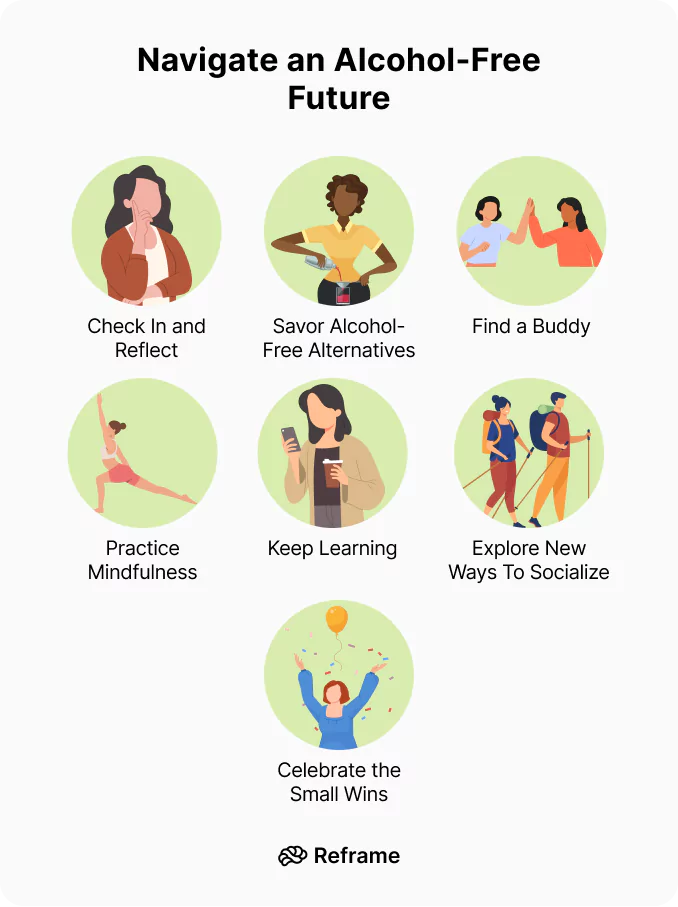How To Successfully Transition to an Alcohol-Free Lifestyle



Mara sat in her favorite cafe, a cozy spot that had witnessed countless memories and milestones. Around her, laughter echoed and music played, setting the perfect backdrop for the milestone she was celebrating. As she toasted with her friends, the shimmering liquid in their glasses wasn’t the usual champagne but sparkling water tinged with a zesty hint of lime. For Mara, this gathering marked a victorious month of choosing to live alcohol-free.
The decision had transformed her in more ways than one. The clarity of mind she now enjoyed was unparalleled, every morning met without the hangover haze. Her mental and physical energy was genuine and untainted. And the bond she felt with her friends? It was deeper, more genuine, not blurred by the effects of alcohol. Mara's choice might resonate with many of us who have, at one point or another, considered letting go of alcohol altogether.
If that decision has been on your mind lately, then you’re in exactly the right place. We’re doing a deep dive into the benefits of an alcohol-free lifestyle.
One of the brain’s most remarkable abilities is its capability to adapt and change, a phenomenon called neuroplasticity. Understanding this quality has paved the way for countless advancements in neuroscientific research. Alcohol consumption is no different: the neuroplasticity repercussions of a drinking habit are significant and multifaceted.
Neurotransmitters are the brain's chemical messengers, and their production and balance are integral to almost every function our brain undertakes. Alcohol has a direct impact on the production of several neurotransmitters, most notably serotonin and dopamine. These neurotransmitters play pivotal roles in regulating our mood, our feelings of pleasure, and our overall well-being. Consistent alcohol consumption can disrupt the delicate balance of neurotransmitters, leading to mood fluctuations, decreased motivation, and an overall feeling of lethargy.
But there's hope! Abstaining from alcohol can reverse many of these mental and emotional effects. The brain begins to realign its production of neurotransmitters, gradually restoring balance. Moreover, neuroplasticity allows for the strengthening of existing neural pathways and — very exciting! — even the creation of new ones. This means cognitive functions such as memory, attention, and decision-making can see marked improvements. Some research even suggests that abstinence can lead to the growth of new brain cells, especially in the hippocampus, a region crucial for memory and learning.
Cardiovascular health is foundational for overall well-being. The intricate network of arteries, veins, and the heart works tirelessly, ensuring every cell gets the oxygen and nutrients it needs.
Alcohol, especially when consumed consistently, is known to raise blood pressure. Chronic elevated blood pressure (hypertension) can lead to various heart diseases, including stroke, heart attack, and even heart failure.
When we abstain from alcohol, the heart responds positively. Blood pressure levels begin to normalize, reducing strain on the heart. This leads to a healthier heart, capable of efficient functioning and less prone to diseases.
It's not uncommon to hear someone claim that a drink helps them sleep. While alcohol might induce drowsiness, it's important to understand that not all sleep is created equal.
REM (rapid eye movement) sleep is a vital phase in our sleep cycle, playing a key role in memory consolidation, mood regulation, and cognitive function. Alcohol consumption, especially close to bedtime, can disrupt the REM phase, leading to fragmented sleep and waking up feeling unrefreshed.
By sidelining alcohol, we can restore our sleep cycle. Over time, with sustained abstinence, our quality of sleep improves, our REM phases get longer, and our mornings become easier.
Alcohol’s allure often lies in its immediate effects. It can temporarily numb feelings, provide a fleeting escape, or give a momentary high.
However, alcohol is, at its core, a depressant. Regular consumption dampens the brain's natural mechanisms to handle stress, anxiety, and negative emotions. Over time, this can lead to exacerbated feelings of anxiety, depression, and even social withdrawal. Going alcohol-free can reverse many of these effects. Over time, the brain regains its natural capability to regulate emotions. When this happens, our anxiety levels drop, our mood stabilizes, and our overall sense of emotional well-being is restored.

Transitioning to an alcohol-free lifestyle doesn’t have to be complicated. With these simple steps, we can get started on a life without alcohol today.
The path to sobriety, like the path to any change, starts with awareness. Setting aside a specific day each week to review alcohol consumption patterns gives us the time we need for conscious recognition. This isn't about immediate drastic changes; it's about noticing trends. By understanding our consumption habits, it's easier to set realistic goals. Perhaps you notice a pattern of drinking more during weekends or after stressful work days. (Maybe you dig deeper and notice “stressful work days” always includes that one day you have your team check-in!) Recognizing these triggers is the first step in forming a strategy to gradually reduce and eventually eliminate alcohol from your routine.
Going alcohol-free doesn't have to mean compromising on taste. The world of non-alcoholic beverages is vast and exciting. Herbal teas, for instance, come in an array of flavors — and they can even have therapeutic properties. Mocktails, with their burst of flavors, can be as sophisticated and delightful as their alcoholic counterparts. Even a glass of sparkling water with a slice of lemon or cucumber can be refreshingly satisfying. Exploring these alternatives can keep you from feeling deprived.
Just like a road trip, a sobriety journey is more manageable with a friend. Teaming up with someone who shares the same goal of quitting alcohol can be both motivating and comforting. Sharing challenges, progress, and successes becomes a source of encouragement. When your desire to continue wanes, your friend can provide the necessary nudge, and vice versa. This accountability and camaraderie can ease the journey toward an alcohol-free life.
Cravings are powerful, and they often act as significant roadblocks. However, mindfulness meditation offers a potent tool against them. By focusing on the present moment, mindfulness teaches the brain to observe cravings without satisfying them. Starting with just a 10-minute daily session can instill this practice, making it easier to resist those urges when they arise.
Understanding the science behind alcohol consumption can be a significant motivator. The Reframe app’s comprehensive program offers insights into the tangible benefits of going alcohol-free. This education not only strengthens your resolve — it also arms you with facts and figures to counter any societal pressures or misconceptions.
Happy hour. Tailgating. Touring a winery. Social situations often trigger alcohol consumption. The key is to diversify the social circle and activities. Engaging in outdoor activities, joining a book club, or enrolling in a hobby class can offer social interaction without the emphasis on alcohol. Over time, these alcohol-free environments become the norm rather than the exception.
Every step towards an alcohol-free life deserves acknowledgment. It's essential to celebrate the small victories along the way. Whether it's a week, a month, or a year without alcohol, each milestone is a testament to your determination, effort, and progress. These celebrations reinforce your positive changes and strengthen your commitment.
Choosing to eliminate alcohol comes with a slew of scientific-backed benefits. From heightened mental clarity to a rejuvenated body, the benefits are profound. From cognitive renewal to emotional resilience, the sobriety journey promises a holistic revival, nourishing your mind, body, and soul.
As more of us toast to our successes with glasses not filled with alcohol but with promise, there's an air of hope — a hope for healthier, more connected tomorrows!
Although it isn’t a treatment for alcohol use disorder (AUD), the Reframe app can help you cut back on drinking gradually, with the science-backed knowledge to empower you 100% of the way. Our proven program has helped millions of people around the world drink less and live more. And we want to help you get there, too!
The Reframe app equips you with the knowledge and skills you need to not only survive drinking less, but to thrive while you navigate the journey. Our daily research-backed readings teach you the neuroscience of alcohol, and our in-app Toolkit provides the resources and activities you need to navigate each challenge.
You’ll meet millions of fellow Reframers in our 24/7 Forum chat and daily Zoom check-in meetings. Receive encouragement from people worldwide who know exactly what you’re going through! You’ll also have the opportunity to connect with our licensed Reframe coaches for more personalized guidance.
Plus, we’re always introducing new features to optimize your in-app experience. We recently launched our in-app chatbot, Melody, powered by the world’s most powerful AI technology. Melody is here to help as you adjust to a life with less (or no) alcohol.
And that’s not all! Every month, we launch fun challenges, like Dry/Damp January, Mental Health May, and Outdoorsy June. You won’t want to miss out on the chance to participate alongside fellow Reframers (or solo if that’s more your thing!).
The Reframe app is free for 7 days, so you don’t have anything to lose by trying it. Are you ready to feel empowered and discover life beyond alcohol? Then download our app through the App Store or Google Play today!

Reframe supports you in reducing alcohol consumption and enhancing your well-being.





